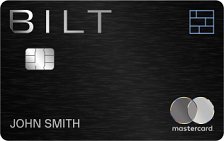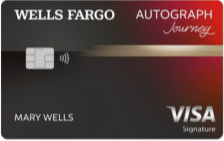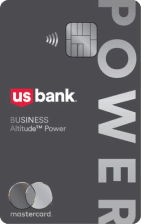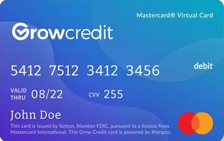
Showing 1,073 Cards
Sort By Column Name:
Wells Fargo Autograph Journey Visa® Credit Card
- 21.24%, 26.24%, or 29.99% variable based on creditworthiness and the Prime Rate Regular Purchase APR
- 21.24%, 26.24%, or 29.99% variable based on creditworthiness and the Prime Rate Balance Transfer APR
- 29.99% variable based on the Prime Rate Cash Advance APR
At a Glance
The Wells Fargo Autograph Journey Card provide a lucrative earning platform for travelers who want the freedom to book travel on their terms and not based on a bank's travel portal. The card earns up to 5X points on travel purchases, offers points transfers to leading carriers and hotels, and comes with a slate of tarvel credits and benefits for a modest $95 annual fee.
- Best Benefits
- Rates & Fees
- Why Should You Apply?
- $50 annual airline statement credit
- No foreign transaction fees
- Earn 5X points on hotels, 4X on airlines, and 3X on travel and dining purchases
- Earn 1X points on all other purchases
- Transfer points to leading loyalty programs
- Regular Purchase APR: 21.24%, 26.24%, or 29.99% variable based on creditworthiness and the Prime Rate
- Balance Transfer APR: 21.24%, 26.24%, or 29.99% variable based on creditworthiness and the Prime Rate
- Balance Transfer Transaction Fee: Introductory fee of either $5 or 3% of the amount of each balance transfer, whichever is greater, for 120 days from account opening. After that, up to 5% for each balance transfer, with a minimum of $5
- Cash Advance APR: 29.99% variable based on the Prime Rate
- Cash Advance Transaction Fee: Either $10 or 5% of the amount of each advance, whichever is greater
- Annual Fee: $95
- Late Payment Penalty Fee: Up to $40
- You already bank with Wells Fargo
- You want a lucrative travel credit card without needing to book in restrictive travel portals
- You don’t want to pay any foreign transaction fees
- You can make use of the $50 annual credit
U.S. Bank Business Altitude™ Power World Elite Mastercard®
- 20.24% to 28.24% variable based on creditworthiness and the Prime Rate Regular Purchase APR
- 20.24% to 28.24% variable based on creditworthiness and the Prime Rate Balance Transfer APR
- 29.99% variable based on the Prime Rate Cash Advance APR
At a Glance
The U.S. Bank Business Altitude™ Power World Elite Mastercard® is a business rewards card for that earns up to 2.5X points on eligible purchases with mobile wallets, with no foreign transaction fees and a $0 introductory annual fee.
- Best Benefits
- Rates & Fees
- Why Should You Apply?
- Earn 6X points on on hotels and car rentals booked in the U.S. Bank Rewards Center
- 2.5X points on up to $5,000 in mobile wallet purchases each quarter
- 2X points on all other purchases
- No foreign transaction fees
- Regular Purchase APR: 20.24% to 28.24% variable based on creditworthiness and the Prime Rate
- Balance Transfer APR: 20.24% to 28.24% variable based on creditworthiness and the Prime Rate
- Balance Transfer Transaction Fee: Either 3% of the amount of each transfer or $5 minimum, whichever is greater
- Cash Advance APR: 29.99% variable based on the Prime Rate
- Cash Advance Transaction Fee: Either 5% of the amount of each advance or $10 minimum, whichever is greater
- Penalty APR: 32.49%
- Annual Fee: $195
- Late Payment Penalty Fee: $40
- Return Payment Penalty Fee: $40
- Over Limit Penalty Fee: $40
- Your company spends heavily on mobile wallet purchases
- You plan to issue multiple employee cards to maximize rewards
- You want to streamline your bonus categories
- You spend enough on to justify the annual fee
Grow Credit Mastercard
- 0.00% Regular Purchase APR
- 0.00% Balance Transfer APR
- 0.00% Cash Advance APR
At a Glance
Better credit through streaming? That's Grow Credit's interesting approach, where you could see your credit score go up simply by paying for your monthly entertainment subscriptions. Although limited in its abilities, Grow Credit's virtual Mastercard has one main goal: to improve your credit standing with the help of something you're likely already paying for.
- Best Benefits
- Rates & Fees
- Why Should You Apply?
- Grow Credit reports customer activity to the three major credit bureaus each month – which can help you establish, build, or grow your credit over time
- Choose from over 100 available subscription services to pay with Grow Credit
- Multiple membership plans to choose from – granting you enhanced benefits such as prmium subscriptions access & cell phone bill payment
- You can join Grow even if you have a limited or no credit history
- Regular Purchase APR: 0.00%
- Balance Transfer APR: 0.00%
- Cash Advance APR: 0.00%
- You want to establish or build up your credit standing
- You have multiple subscription services that you pay for on a regular basis
- You prefer to have all your subscriptions under the same payment method with minimal fuss
Upgrade Select Visa®
- 21.96% to 29.99% variable based on creditworthiness and the Prime Rate Regular Purchase APR
- 21.96% to 29.99% variable based on creditworthiness and the Prime Rate Balance Transfer APR
At a Glance
The Upgrade Select Visa® combines the best of the regular Upgrade Card for those looking to establish a strong credit history with unsecured credit for the first time. Cardholders enjoy a sensible welcome bonus for a modest $39 annual fee.
- Best Benefits
- Rates & Fees
- Why Should You Apply?
- $200 bonus after opening a Rewards Checking Plus account and making 3 debit card transactions*
- Combine the flexibility of a card with the predictability of a personal loan
- Shop smarter with Upgrade Shopping! Get exclusive savings at stores, restaurants, and more
- See if you qualify in seconds with no impact to your credit score
- No touch payments with contactless technology built in
- Mobile app to access your account anytime, anywhere
- Use your card anywhere Visa is accepted
- Relax knowing that you are protected in case of unauthorized transactions with Visa’s Zero Liability Policy
- Regular Purchase APR: 21.96% to 29.99% variable based on creditworthiness and the Prime Rate
- Balance Transfer APR: 21.96% to 29.99% variable based on creditworthiness and the Prime Rate
- Balance Transfer Transaction Fee: Up to 5%
- Annual Fee: $39
- Foreign Transaction Fee: Up to 5%
- Late Payment Penalty Fee: May apply
- You struggle to pay off your credit card balances
- You want a structured repayment plan
- You can reliably pay off your statement balances and establish a strong credit history
- You have a desire to get debt-free quickly
- You hate penalty or other hidden fees
Universal Rewards Visa Signature®
- 21.99% to 28.99% variable based on creditworthiness and the Prime Rate Regular Purchase APR
- 21.99% to 28.99% variable based on creditworthiness and the Prime Rate Balance Transfer APR
- 28.99% variable based on the Prime Rate Cash Advance APR
- 0% for 6 months from account opening date Intro Purchase APR
At a Glance
The Universal Rewards Visa Signature® Card is a no frill rewards card that earns 2% back on eligible Universal purchases, 1% back on all other purchases, and more - for a $0 annual fee.
- Best Benefits
- Rates & Fees
- Why Should You Apply?
- Earn 2% back in rewards on qualifying Universal purchases
- 1% back on all other purchases
- 10% ff select merchandise, food and beverage purchases
- No annual fee
- Intro Purchase APR: 0% for 6 months from account opening date
- Regular Purchase APR: 21.99% to 28.99% variable based on creditworthiness and the Prime Rate
- Balance Transfer APR: 21.99% to 28.99% variable based on creditworthiness and the Prime Rate
- Balance Transfer Transaction Fee: Either $10 or 5% of the amount of each transfer, whichever is greater
- Cash Advance APR: 28.99% variable based on the Prime Rate
- Cash Advance Transaction Fee: Either $15 or 5% of the amount of each cash advance, whichever is greater
- Foreign Transaction Fee: 3% of the transaction amount in U.S. dollars
- Late Payment Penalty Fee: Up to $40
- Return Payment Penalty Fee: Up to $35
- You love theme parks but prefer Universal Studios
- You don't want to pay an annual fee
- You want basic cash back rewards on everyday purchases
You've viewed 5 of 1,073 credit cards
Editorial Disclosure – The opinions expressed on BestCards.com's reviews, articles, and all other content on or relating to the website are solely those of the content’s author(s). These opinions do not reflect those of any card issuer or financial institution, and editorial content on our site has not been reviewed or approved by these entities unless noted otherwise. Further, BestCards.com lists credit card offers that are frequently updated with information believed to be accurate to the best of our team's knowledge. However, please review the information provided directly by the credit card issuer or related financial institution for full details.








